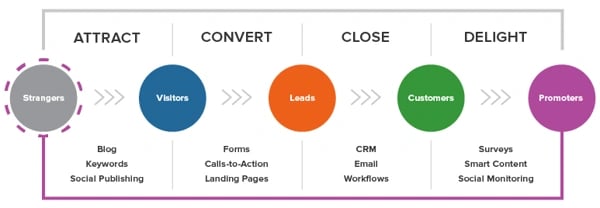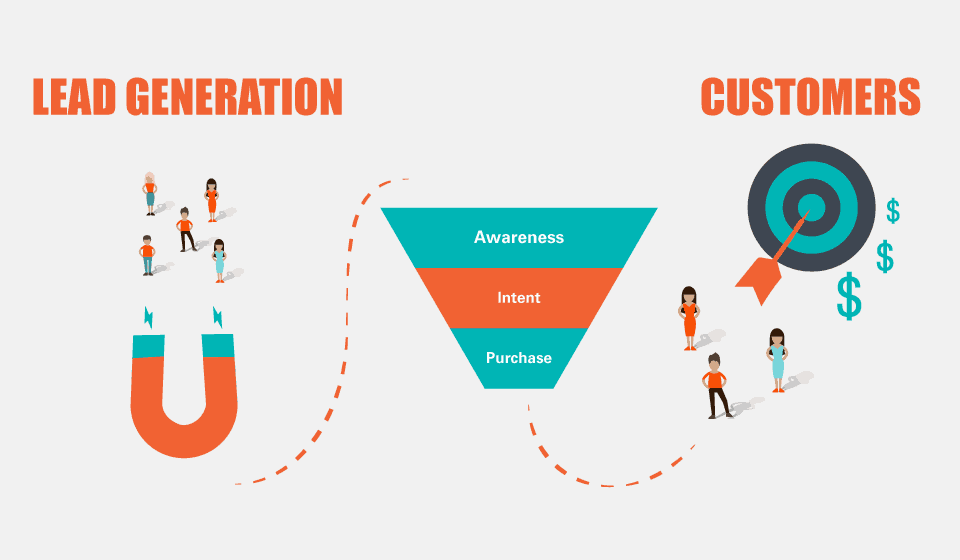What is lead generation?
Lead generation is the process of attracting potential customers and collecting their contact information or demographic data to generate interest in a product or service. This involves creating consumer interest in a business by capturing their information, with the intention of turning that interest into sales.
The process typically involves techniques such as email marketing, content marketing, social media, landing pages, and direct marketing. Lead generation specialists identify and cultivate potential customers for a business’s products or services. This guide will explore the various techniques and tools required for successful lead generation, including identifying potential leads, qualifying them, reaching out to them, and nurturing them.
Ultimately, lead generation is a critical component of a successful marketing strategy that can help businesses grow and achieve their goals.

Credit: blog.hubspot.com
What Is Lead Generation
Lead generation refers to the process of creating interest among potential customers for the products or services of a business. A lead is the information of a customer interested in a particular product or service, including their contact and sometimes demographic information.
This process is often accomplished through various marketing strategies including email marketing, social media, and advertising.
Lead Generation is the process of creating interest among prospective customers about a product or service to convert them into sales. This can be achieved by collecting contact information of interested customers through web forms or other methods. Examples of Lead Generation strategies include email marketing, social media, advertising, landing pages, and direct marketing. Tools used for Lead Generation include Google Analytics, Mailchimp, Unbounce, LinkedIn, Pipedrive, and Intercom. The job of a Lead Generation Specialist is to attract and engage potential customers for the organization to build a stronger sales funnel. The process involves identifying and qualifying leads, reaching out to them, and nurturing them for conversion.
Lead Generation Companies
In the world of marketing, lead generation refers to the process of creating interest in a business’s products or services among potential customers. A lead is the contact information, and sometimes demographic information, of a person who has expressed interest in a product or service. Some top lead generation companies include HubSpot, Salesforce Inc., ZoomInfo, Callbox, Inc., SalesRoads, and Zoho Corporation.
There are various lead generation strategies, including email marketing, content marketing, social media, advertising, landing pages, and direct marketing. To implement these strategies, businesses can use lead generation tools such as Google Analytics, Mailchimp, Unbounce, LinkedIn, Pipedrive, and Intercom, Inc.
The process of lead generation involves identifying potential leads, qualifying them, reaching out to them, and nurturing them until they are ready to make a purchase. Lead generation specialists are responsible for finding and engaging potential customers to build a stronger sales funnel for a business.
Overall, lead generation is a crucial component of most businesses’ marketing efforts, as it helps to drive sales and revenue growth.
Lead Generation Strategies
Lead generation is the process of attracting potential customers to a business and encouraging them to express their interest in a product or service. A lead is the contact information of a customer who is interested in a business offering.
Effective lead generation strategies include email marketing, content marketing, social media, advertising, and direct marketing.
Lead generation refers to the process of creating interest and inquiries from potential customers for a business’s products or services. The contact information collected from the interested parties is known as a “lead”. A successful lead generation strategy involves several tactics such as email marketing, content marketing, social media, advertising, landing pages, and direct marketing. Tools like Google Analytics, Mailchimp, Unbounce, LinkedIn, Pipedrive, and Intercom are used to generate leads. Qualifying and nurturing the potential leads is important in building a strong sales funnel.

Credit: www.montdigital.com
Lead Generation Tools
Lead generation refers to the method of attracting potential customers and engaging with them to create interest in a product or service. Typically, lead generation involves collecting contact information from visitors through a web form or other means. There are various tools and strategies, such as email marketing, content marketing, and social media that can be used for successful lead generation.
Lead generation is the process of generating consumer interest, collecting their contact information, and turning that interest into a sale. The process involves identifying potential leads, qualifying them, reaching out to them, and nurturing them. There are many lead generation strategies including email marketing, content marketing, social media, advertising, landing pages, and direct marketing. Some popular lead generation tools are Google Analytics, Mailchimp, Unbounce, LinkedIn, Pipedrive, and Intercom, Inc. These tools help in identifying potential customers and managing their contact information. Lead generation specialists play a vital role in finding and engaging potential customers for an organization, building a stronger sales funnel, and converting them into loyal customers.
Lead Generation Process
Lead generation is the process of creating interest or inquiry into a business’s products or services. It typically involves collecting a potential customer’s contact information through a web form. Strategies for lead generation include email marketing, content marketing, social media, advertising, and direct marketing.
Lead generation is the process of creating interest and identifying potential customers for a business’s products or services. This process involves identifying potential leads, qualifying them, reaching out to them and nurturing the relationship. For online marketing, this is typically done by collecting a visitor’s contact information via a web form. Lead generation strategies can include email marketing, content marketing, social media, advertising, landing pages and direct marketing. To successfully generate leads, businesses can use tools such as Google Analytics, Mailchimp, Unbounce, LinkedIn, Pipedrive and Intercom, Inc. A lead generation specialist is responsible for finding and engaging potential customers to build a stronger sales funnel. The ultimate goal of lead generation is to turn potential customers into paying customers.
What Does A Lead Generation Specialist Do?
A lead generation specialist is responsible for identifying and engaging potential customers for a business’s products or services. This process involves collecting contact and demographic information of interested customers and nurturing them to convert into a sale. Lead generation uses various strategies such as email marketing, social media, advertising, landing pages, direct marketing, and tools like Google Analytics or Mailchimp.
Lead generation is the process of identifying potential customers for a business’s products or services. A lead generation specialist is responsible for finding and engaging with potential customers to build a stronger sales funnel. This involves identifying and qualifying leads, reaching out to leads, and nurturing them through various marketing strategies such as email marketing, content marketing, social media, advertising, and direct marketing. Lead generation strategies can vary depending on the industry and target audience, and may involve the use of lead generation tools such as Google Analytics, Mailchimp, Unbounce, LinkedIn, Pipedrive, and Intercom. The ultimate goal is to turn consumer interest into a sale, typically by collecting contact information via a web form. Examples of lead generation tactics include job applications, blog posts, coupons, live events, and online content.

Credit: directiveconsulting.com
Frequently Asked Questions For What Is Lead Generation
What Do You Mean By Lead Generation?
Lead generation is the process of creating consumer interest or inquiry into the products or services of a business with the goal of turning that interest into a sale. It involves collecting a visitor’s contact information (called a “lead”) via a web form.
The lead is the contact information and, in some cases, demographic information of a customer who is interested in a specific product or service.
What Is An Example Of Lead Generation?
Lead generation is the process of attracting potential customers to a business and turning their interest into a sale. For example, generating leads through job applications, blog posts, coupons, live events, and online content. The goal is to collect contact information (a “lead”) and demographic data to establish a consumer interest in a specific product or service.
Which Are The 4 Steps Of The Lead Generation Process?
The 4 steps of the lead generation process are identifying potential leads, qualifying leads, reaching out to leads, and nurturing leads.
What Does Lead Generation Person Do?
A lead generation person finds and engages potential customers to build a stronger sales funnel. The process involves identifying and nurturing potential leads who have shown interest in a specific product or service. These leads are then passed on to the sales team to convert into paying customers.
Conclusion
Lead generation is the lifeblood of any successful business. It is the process of identifying potential customers and nurturing their interest in your products or services, with the ultimate goal of converting them into paying customers. In today’s fast-paced digital world, lead generation has become more important than ever before.
By leveraging the right strategies and tools, businesses can generate high-quality leads and achieve their revenue goals. Whether you’re focused on email marketing, social media, or advertising, it’s essential to understand the basics of lead generation and how it can help take your business to the next level.